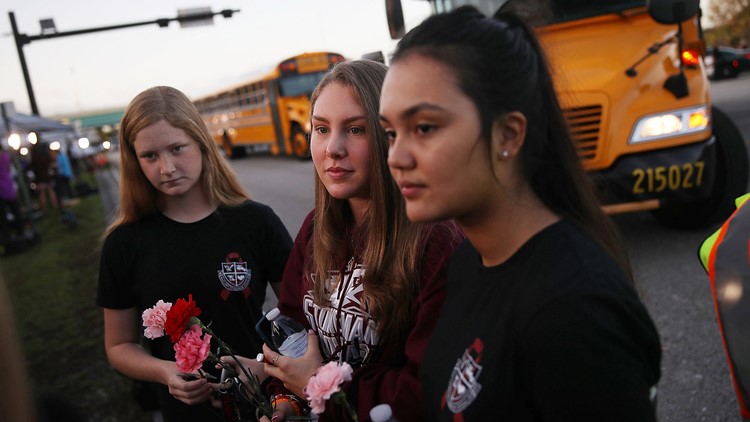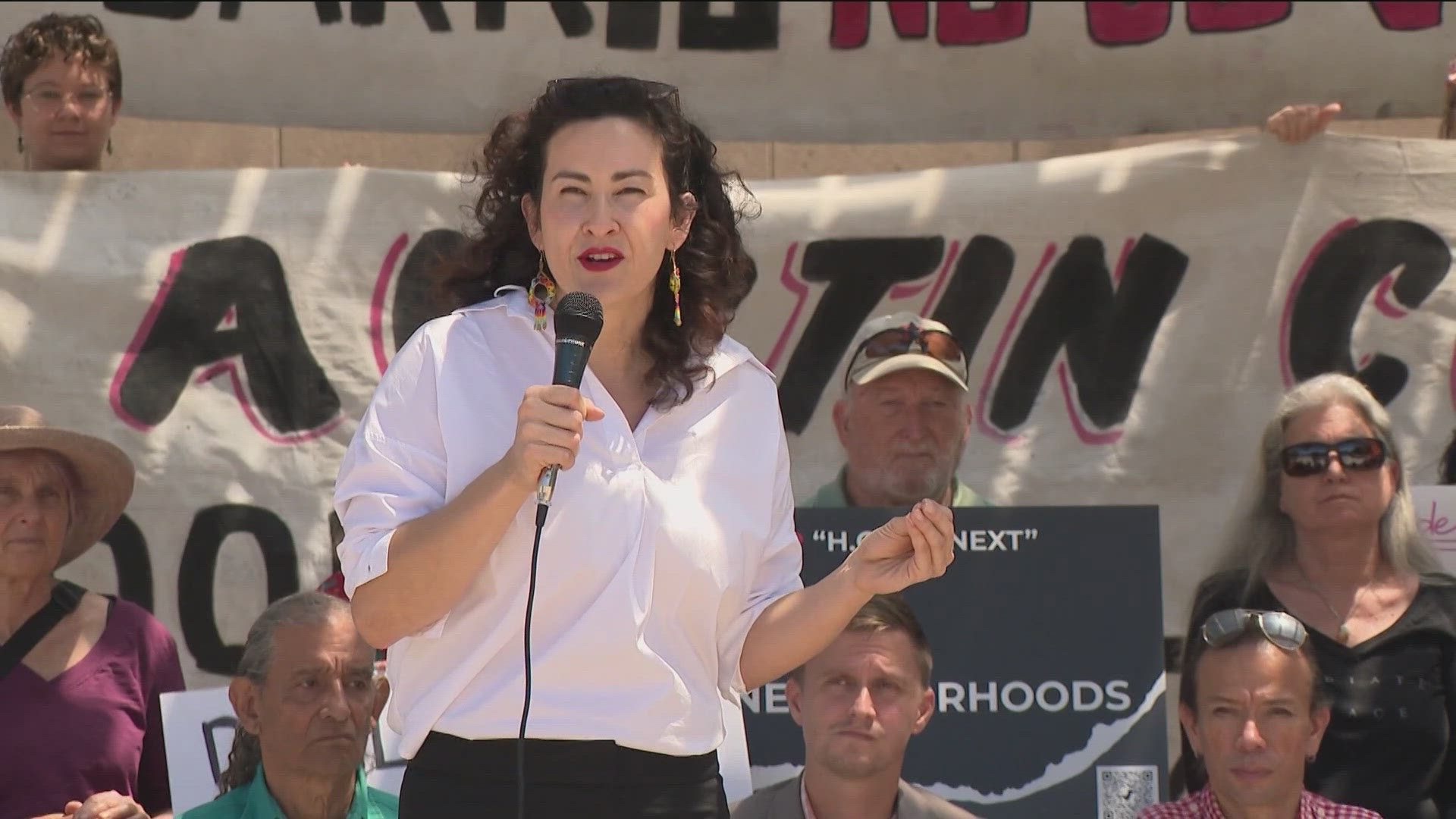More than 3,000 students — or 95% of the school — returned to Marjory Stoneman Douglas High School here Wednesday for the first time since a gunman claimed 17 lives in the halls on Valentine's Day.
They were greeted by grief counselors, therapy dogs, an outpouring of support from teachers — and about 50 heavily armed police officers.
The counselors and friendly animals were there “to provide a lot of love, a lot of understanding” and to help students “ease back” into their school routines, said Broward Schools Superintendent Robert Runcie.
The heavily armed police were there to provide protection and reassurance, but the sight of weapons on campus were an eerie reminder to some of what they had endured.
“This is a picture of education in fear in this country. The NRA (National Rifle Association) wants more people just like this, with that exact firearm to scare more people and sell more guns,” said David Hogg, who has become a leading voice in the students’ movement to control assault weapons. “I know one of those bullets could be shredding through me if I was misidentified as a school shooter,” he added.
One common feature of an American high school was missing: backpacks, like one used by expelled student Nikolas Cruz to smuggle in his AR-15, assault weapon two weeks ago. Principal Ty Thomas said in a tweet that “our focus is on emotional readiness and comfort not curriculum: so there is no need for backpacks.”

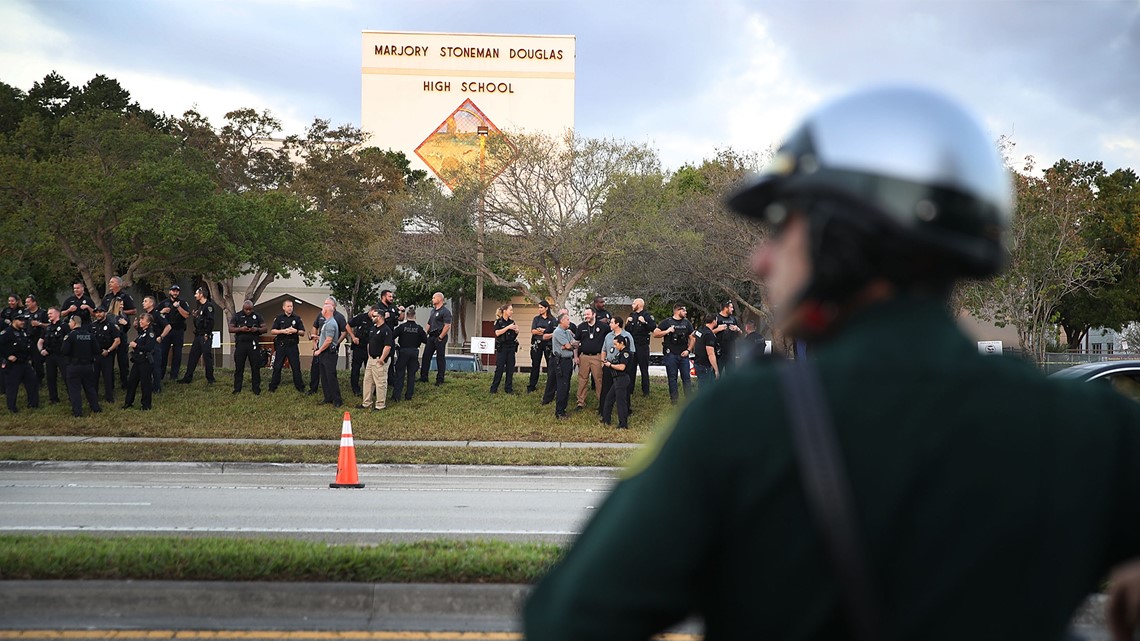
Security tight as students return
It was an emotional — almost surreal — moment for students, staff, police, parents, and teachers as they passed through a security cordon against a backdrop of a cars circling the school amid a long line of TV trucks and media vans.
Runcie said 3,123 students showed up, only about 170 fewer than on a normal day, for an attendance of 95%. On Wednesday, and for the remainder of the week, only a half-day of classes were scheduled to help students ease back into their old routine.
The superintendent said 150 counselors were on hand to listen and provide emotional support, along with 40 therapy dogs and other animals as requested by staff. Also on hand were principals from other Broward County schools in a show of solidarity.
But the signs of the mass shooting were also in evidence. In the empty seats of students killed in the melee were candles, teddy bears or flowers.
A group of residents sang Let it Shine outside the school; crossing guards and local officers hugged students and welcomed them back.
Parents, friends and neighbors lined the sidewalks holding signs of encouragement, like "We stand with you." Someone brought a pony and a sign promising: "Free pony kisses."
A “Welcome Back Eagles” banner covered the main entrance, and the walkway leading onto the campus was lined with flowers, photographs and other memorials to those killed.
Wednesday’s class schedule started with fourth period, so that students and teachers could return to the people they were with during the shooting. The freshman building where the massacre took place remains cordoned off.
Candace Caine dropped her daughter off at school and said she was counting the minutes until she could see her again. “She struggled last night and couldn’t sleep. She was moaning and groaning the whole time we were getting to school but she did it," she said.
Her daughter, Maddy King, is a sophomore and was in the freshman building where the 19-year-old Cruz, a former student, opened fire.
While it was tough to let her daughter go, she has faith they will find a new normal. “I’m worried about her and the things she saw and her description of the event was from out of a movie,” Caine said. “We’ll just take it day by day.”
Casey Sherman, a 17-year-old junior, told the Associated Press she thought the schedule was a good idea so kids can “get it over with,” and not worry about it all day. Up until 11:30 p.m. the night before working on preparations for the March 14 national school walkout against gun violence, she said she wasn't afraid to be return, "just nervous."
"We did go through a tragedy," said Sherman, who walked in holding hands with her boyfriend. "It was terrible but if you let it stop you ... it's not how you go down, it's how you get back up."

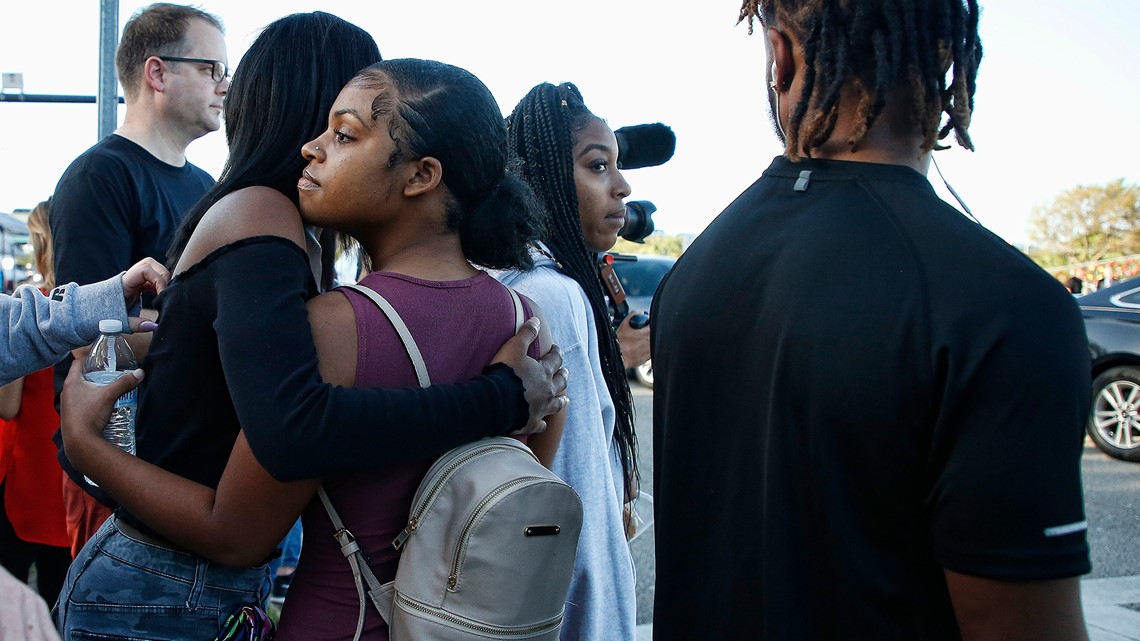
A school transformed
It is a school transformed since Cruz began his rampage ear the end of classes on Feb. 14. Over seven minutes, after pulling a fire alarm, the gunman killed 14 students and three teachers before casually fleeing.
Cruz, known as a troubled student with a series of encounters with police and social workers over his erratic behavior, was apprehended nearby and charged with multiple counts of premeditated murder.
The ordeal hurled the school into the center of a heated debate over how to stop a a seemingly endless series of mass shootings.
It thrust students like Hogg, Emma Gonzalez and Cameron Kasky into the national spotlight as they ignited a nationwide movement by young people calling for gun control measures, and an end to such mass killings. Almost overnight, they organized marches for March 24 in Washington and over the country and turned up at televised debates with senators and and on national TV.
After the whirlwind, Wednesday was a time for classes and an attempt to restore some normalcy.
Douglas sophomore Charlotte Dixon said some of her friends are having a hard time returning to classes. But they are encouraged by the attention to gun laws their actions have brought.
“I’m so glad that people are stepping forward and talking about keeping it relevant … because it shouldn’t happen to anyone ever again,” Dixon said.

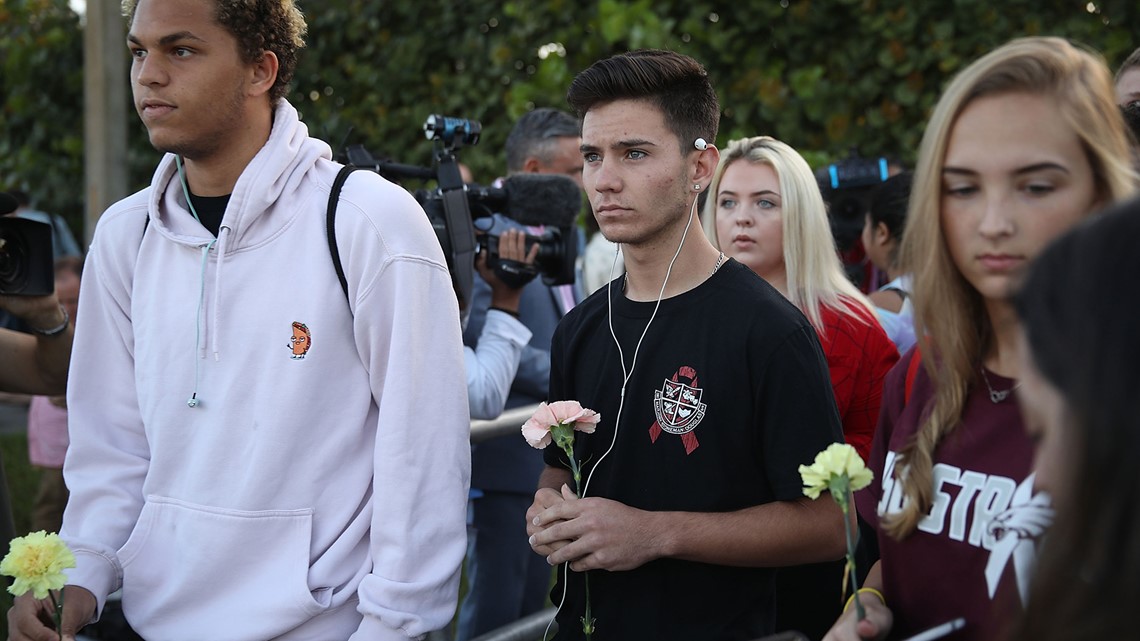
Action in Florida's capital
In Tallahassee, relatives of the Stoneman Douglas victims kept up the pressure in Florida’s capital on Tuesday with emotional testimony during a legislative hearing to discuss passing a bill that would, among other things, raise the age limit to buy long guns from 18 to 21.
The bill also would create a program that allows teachers who receive law-enforcement training and are deputized by the local sheriff’s office to carry concealed weapons in the classroom, if also approved by the school district. The school’s superintendent has spoken out firmly against that measure.
Florida's House Appropriations Committee’s 23-6 vote in favor of the bill Tuesday followed more than four hours of emotional discussion with the parents of some of the 17 killed, and nearly two weeks of activism by students on social media and in televised debates.
Gov. Rick Scott, who met with officials in Miami-Dade County, told reporters that he hopes a gun and school-safety bill is passed before March 9, the end of Florida’s annual legislative session. He had proposed measures that overlap with the legislature’s plan but did not include arming teachers. However, he declined to say Tuesday whether he would veto the sweeping package if it included that provision.
The Florida Senate’s version of the school-safety bill was approved by a second committee on a 13-7 vote Tuesday evening. Sen. Bill Galvano, who is designated to become the next Senate president and is ushering through the bill, said the earliest it will be considered by the full Senate is Friday.
Marion Hammer, a lobbyist for the National Rifle Association and Unified Sportsmen of Florida, told the House Appropriations Committee that she supports tightening school security and keeping guns out of the hands of the mentally ill, but not the House bill’s gun-ownership restrictions, which she later said would not have stopped the Parkland shooting.
“Part of what we need to do is make people understand that guns are not the problem,” she said after the hearing. “So passing more laws dealing with guns as a solution to a problem that exists within the enforcement of laws is just kind of silly.”
Collins and Carloni report for the Naples Daily News. Contributing: Associated Press


